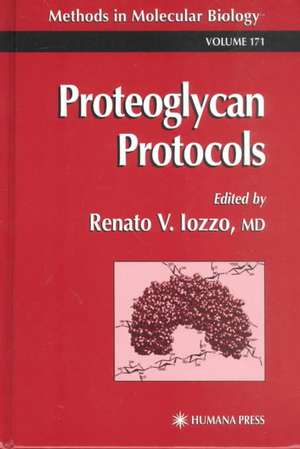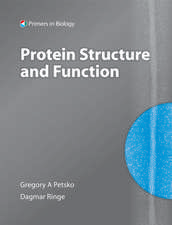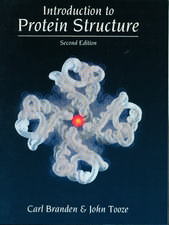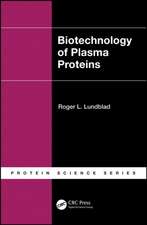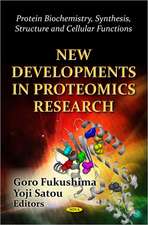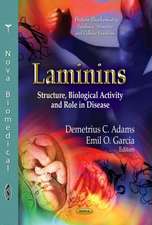Proteoglycan Protocols: Methods in Molecular Biology, cartea 171
Editat de Renato V. Iozzoen Limba Engleză Hardback – iun 2001
| Toate formatele și edițiile | Preț | Express |
|---|---|---|
| Paperback (1) | 951.11 lei 6-8 săpt. | |
| Humana Press Inc. – 10 noi 2010 | 951.11 lei 6-8 săpt. | |
| Hardback (1) | 967.22 lei 6-8 săpt. | |
| Humana Press Inc. – iun 2001 | 967.22 lei 6-8 săpt. |
Din seria Methods in Molecular Biology
- 9%
 Preț: 791.63 lei
Preț: 791.63 lei - 23%
 Preț: 598.58 lei
Preț: 598.58 lei - 20%
 Preț: 882.98 lei
Preț: 882.98 lei -
 Preț: 252.05 lei
Preț: 252.05 lei - 5%
 Preț: 802.70 lei
Preț: 802.70 lei - 5%
 Preț: 729.61 lei
Preț: 729.61 lei - 5%
 Preț: 731.43 lei
Preț: 731.43 lei - 5%
 Preț: 741.30 lei
Preț: 741.30 lei - 5%
 Preț: 747.16 lei
Preț: 747.16 lei - 15%
 Preț: 663.45 lei
Preț: 663.45 lei - 18%
 Preț: 1025.34 lei
Preț: 1025.34 lei - 5%
 Preț: 734.57 lei
Preț: 734.57 lei - 18%
 Preț: 914.20 lei
Preț: 914.20 lei - 15%
 Preț: 664.61 lei
Preț: 664.61 lei - 15%
 Preț: 654.12 lei
Preț: 654.12 lei - 18%
 Preț: 1414.74 lei
Preț: 1414.74 lei - 5%
 Preț: 742.60 lei
Preț: 742.60 lei - 20%
 Preț: 821.65 lei
Preț: 821.65 lei - 18%
 Preț: 972.30 lei
Preț: 972.30 lei - 15%
 Preț: 660.49 lei
Preț: 660.49 lei - 5%
 Preț: 738.41 lei
Preț: 738.41 lei - 18%
 Preț: 984.92 lei
Preț: 984.92 lei - 5%
 Preț: 733.29 lei
Preț: 733.29 lei -
 Preț: 392.60 lei
Preț: 392.60 lei - 5%
 Preț: 746.26 lei
Preț: 746.26 lei - 18%
 Preț: 962.66 lei
Preț: 962.66 lei - 23%
 Preț: 860.22 lei
Preț: 860.22 lei - 15%
 Preț: 652.64 lei
Preț: 652.64 lei - 5%
 Preț: 1055.50 lei
Preț: 1055.50 lei - 23%
 Preț: 883.87 lei
Preț: 883.87 lei - 5%
 Preț: 1141.13 lei
Preț: 1141.13 lei - 19%
 Preț: 491.89 lei
Preț: 491.89 lei - 5%
 Preț: 1038.86 lei
Preț: 1038.86 lei - 5%
 Preț: 524.16 lei
Preț: 524.16 lei - 18%
 Preț: 2122.34 lei
Preț: 2122.34 lei - 5%
 Preț: 1299.23 lei
Preț: 1299.23 lei - 5%
 Preț: 1339.12 lei
Preț: 1339.12 lei - 18%
 Preț: 1390.26 lei
Preț: 1390.26 lei - 18%
 Preț: 1395.63 lei
Preț: 1395.63 lei - 18%
 Preț: 1129.65 lei
Preț: 1129.65 lei - 18%
 Preț: 1408.26 lei
Preț: 1408.26 lei - 18%
 Preț: 1124.92 lei
Preț: 1124.92 lei - 18%
 Preț: 966.27 lei
Preț: 966.27 lei - 5%
 Preț: 1299.99 lei
Preț: 1299.99 lei - 5%
 Preț: 1108.51 lei
Preț: 1108.51 lei - 5%
 Preț: 983.76 lei
Preț: 983.76 lei - 5%
 Preț: 728.16 lei
Preț: 728.16 lei - 18%
 Preț: 1118.62 lei
Preț: 1118.62 lei - 18%
 Preț: 955.25 lei
Preț: 955.25 lei - 5%
 Preț: 1035.62 lei
Preț: 1035.62 lei
Preț: 967.22 lei
Preț vechi: 1179.53 lei
-18% Nou
Puncte Express: 1451
Preț estimativ în valută:
185.10€ • 200.99$ • 155.48£
185.10€ • 200.99$ • 155.48£
Carte tipărită la comandă
Livrare economică 23 aprilie-07 mai
Preluare comenzi: 021 569.72.76
Specificații
ISBN-13: 9780896037595
ISBN-10: 0896037592
Pagini: 558
Ilustrații: XVI, 558 p.
Dimensiuni: 155 x 235 x 33 mm
Greutate: 1.07 kg
Ediția:2001
Editura: Humana Press Inc.
Colecția Humana
Seria Methods in Molecular Biology
Locul publicării:Totowa, NJ, United States
ISBN-10: 0896037592
Pagini: 558
Ilustrații: XVI, 558 p.
Dimensiuni: 155 x 235 x 33 mm
Greutate: 1.07 kg
Ediția:2001
Editura: Humana Press Inc.
Colecția Humana
Seria Methods in Molecular Biology
Locul publicării:Totowa, NJ, United States
Public țintă
ResearchCuprins
Isolation and Purification.- Isolation of Proteoglycans from Cell Cultures and Tissues.- Isolation of Proteoglycans from Tendon.- Purification of Proteoglycans from Mineralized Tissues.- Purification of Perlecan from Endothelial Cells.- Isolation and Characterization of Nervous Tissue Proteoglycans.- Analysis of Proteoglycans and Glycosaminoglycans from Drosophila.- Cartilage and Smooth Muscle Cell Proteoglycans Detected by Affinity Blotting Using Biotinylated Hyaluronan.- Preparation of Proteoglycans for N-Terminal and Internal Amino Acid Sequence Analysis.- High-Specific-Activity 35S-Labeled Heparan Sulfate Prepared from Cultured Cells.- Selective Detection of Sulfotransferase Isoforms by the Ligand Affinity-Conversion Approach.- Particulate and Soluble Glycosaminoglycan-Synthesizing Enzymes.- Disaccharide Composition of Hyaluronan and Chondroitin/Dermatan Sulfate.- Integral Glycan Sequencing of Heparan Sulfate and Heparin Saccharides.- Analytical and Preparative Strong Anion-Exchange HPLC of Heparan Sulfate and Heparin Saccharides.- Proteoglycans Analyzed by Composite Gel Electrophoresis and Immunoblotting.- Quantitation of Proteoglycans in Biological Fluids Using Alcian Blue.- Cellulose Acetate Electrophoresis of Glycosaminoglycans.- Disaccharide Composition in Glycosaminoglycans/Proteoglycans Analyzed by Capillary Zone Electrophoresis.- Intact and Oligomeric Glycosaminoglycans Analyzed with Capillary Electrophoresis.- Expression, Detection, and Degradation.- Recombinant Expression of Proteoglycans in Mammalian Cells.- Purification of Recombinant Human Decorin and Its Subdomains.- Prokaryotic Expression of Proteoglycans.- Proteoglycan Gene Targeting in Somatic Cells.- Constitutive and Inducible Antisense Expression.- Cell-Mediated Transfer of Proteoglycan Genes.- Morphological Evaluation of Proteoglycans in Cells and Tissues.- Expression and Characterization of Engineered Proteoglycans.- Intracellular Localization of Engineered Proteoglycans.- Selection of Glycosaminoglycan-Deficient Mutants.- Xyloside Priming of Glycosaminoglycan Biosynthesis and Inhibition of Proteoglycan Assembly.- Inhibition of Heparan Sulfate Synthesis by Chlorate.- Detection of Proteoglycan Core Proteins with Glycosaminoglycan Lyases and Antibodies.- Proteoglycan Core Proteins and Catabolic Fragments Present in Tissues and Fluids.- Degradation of Heparan Sulfate by Nitrous Acid.- Degradation of Heparan Sulfate with Heparin Lyases.- Degradation of Chondroitin Sulfate and Dermatan Sulfate with Chondroitin Lyases.- In Vitro Assay for Hyaluronan Synthase.- Hyaluronidase Activity and Hyaluronidase Inhibitors.- Detecting Hyaluronidase and Hyaluronidase Inhibitors.- Interacations.- Affinity Coelectrophoresis of Proteoglycan-Protein Complexes.- Binding Constant Measurements for Inhibitors of Growth Factor Binding to Heparan Sulfate Proteoglycans.- Interaction of Proteoglycans with Receptor Tyrosine Kinases.- Measuring Single-Cell Cytosolic Ca2+ Concentration in Response to Proteoglycans.- Serum Amyloid A Peptide Interactions with Glycosaminoglycans.- Interactions of Lipoproteins with Proteoglycans.- Hyaluronan and Hyaluronan-Binding Proteins Probes for Specific Detection.- Novel Confocal-FRAP Analysis of Carbohydrate-Protein Interactions Within the Extracellular Matrix.- Regulatory Roles of Syndecans in Cell Adhesion and Invasion.- Optical Biosensor Techniques to Analyze Protein-Polysaccharide Interactions.- Phage Display Technology to Obtain Antiheparan Sulfate Antibodies.- Tissue-Specific Binding by FGF and FGF Receptors to Endogenous Heparan Sulfates.
Recenzii
"The book is strategically subdivide into 3 sections (isolation and purification; expression, detection, and degradation; interactions) with a total of 51 chapters ( 19, 20, and 12 per subheading). Their contents dispel the clichés about work with sticky glycosaminoglycans being tedious, unrewarding, and mostly for the sake of old-fashioned...systematics....I expect even experts in certain areas to benefit from the whole book, whose rightful place will be on the bench, not on the shelf." - ChemBioChem
"This book will appeal to both those new to the subject and experts in the field as the protocols outlined are both wide ranging, comprehensive, and easy to follow....strongly recommend it to those new to proteoglycan research, and would regard it as an essential addition to any proteoglycan research laboratory library." - Molecular Biotechnology
"...this book will be a very useful tool for many specialists working in the fields of glycobiology, biotechnology, biochemistry, and experimental medicine. Detailed description of the methods employed for various aspects of proteoglycan analysis and comprehensive bibliography accompanying each chapter make this book especially valuable for a large audience of the mentioned specialists." - Biochemistry
"This book will appeal to both those new to the subject and experts in the field as the protocols outlined are both wide ranging, comprehensive, and easy to follow....strongly recommend it to those new to proteoglycan research, and would regard it as an essential addition to any proteoglycan research laboratory library." - Molecular Biotechnology
"...this book will be a very useful tool for many specialists working in the fields of glycobiology, biotechnology, biochemistry, and experimental medicine. Detailed description of the methods employed for various aspects of proteoglycan analysis and comprehensive bibliography accompanying each chapter make this book especially valuable for a large audience of the mentioned specialists." - Biochemistry
Textul de pe ultima copertă
Proteoglycans, highly complex macromolecules found in mammalian and lower organisms, serve a multitude of biological functions. In Proteoglycan Protocols, Renato Iozzo, MD, and an authoritative team of investigators present for the first time a comprehensive and up-to-date collection of readily reproducible preparative and analytical methods for the in-depth analysis of these important compounds. Featuring step-by-step protocols, this book will enable both novice and experienced researchers to isolate intact proteoglycans from tissues and cultured cells, to establish the composition of their carbohydrate moieties, and to generate strategies for prokaryotic and eukaryotic expression. There are also detailed techniques for the suppression of specific proteoglycan genes, for the detection of mutant cells and their degradation products, and for studying specific interactions between proteoglycans and extracellular matrix proteins and with growth factors and their receptors. Each method is carefully described by leading experts in the field and includes practical considerations that are often lacking in formal papers.
Authoritative and detailed, Proteoglycan Protocols offers molecular and cellular biologists, biochemists, pathologists, and geneticists a comprehensive reference and practical guide to the most common methods used today for the isolation and characterization of proteoglycans from cultured cells, tissues, and biological fluids.
Authoritative and detailed, Proteoglycan Protocols offers molecular and cellular biologists, biochemists, pathologists, and geneticists a comprehensive reference and practical guide to the most common methods used today for the isolation and characterization of proteoglycans from cultured cells, tissues, and biological fluids.
Caracteristici
Includes supplementary material: sn.pub/extras
